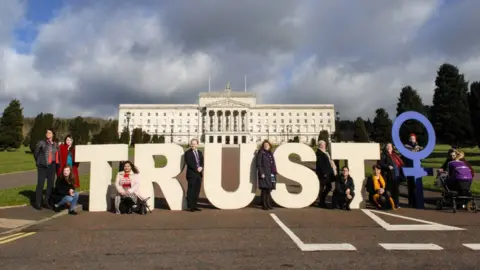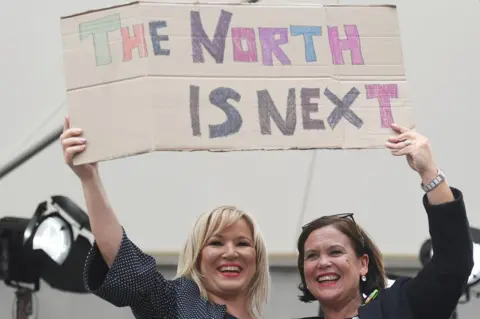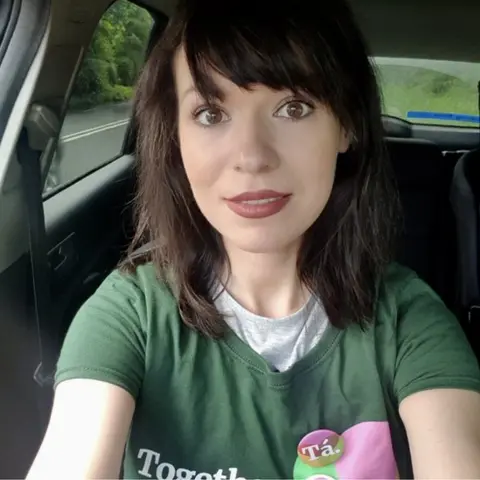After Ireland says Yes to abortion, what next for Northern Ireland?
 Alliance for Choice
Alliance for ChoiceThe Republic of Ireland voted on Friday to repeal part of its constitution that effectively outlawed abortion.
That change will soon leave Northern Ireland as the only part of either the UK or Ireland where abortion is illegal unless there is a serious risk to a woman's life or health. Unlike other parts of the UK, the 1967 Abortion Act does not extend to Northern Ireland.
Ruth Foster, a Belfast-born student in her final year at the University of Edinburgh, thinks many people in the rest of the UK are unaware of the legal position in Northern Ireland.
 Ruth Foster
Ruth FosterShe was one of many who spoke out about what she says was misinformation and misconceptions online, and says that momentum must not be lost from the #RepealTheEighth movement.
Saturday's overwhelming Yes result in the Republic of Ireland has galvanised pro-choice groups and activists.
Many have said they plan to turn their attention to Northern Ireland's laws. Several Westminster politicians suggested that the government should bring Northern Ireland in line with the rest of the UK.
'Horrifyingly painful'
After Saturday's Yes vote, one young woman from Northern Ireland decided to speak up about her experience of having an illegal, self-medicated abortion at home several years ago.
As a student recovering from mental health issues, Amy found herself pregnant when her contraception failed.
Unable to afford to travel to Britain for a procedure, she ordered abortion pills online.
She said the abortion was "horrifyingly painful" to go through without medical help or pain relief.
Since Amy had her crisis pregnancy, measures have been implemented to help fund women travelling to Britain for NHS abortions.
 Reuters
ReutersPolitical resistance
Politicians from the Democratic Unionist Party (DUP) have hit back at calls to extend abortion services in Northern Ireland.
MP Ian Paisley Jnr tweeted on Saturday that Northern Ireland "should not be bullied into accepting abortion on demand".
Another politician from the party, Jim Wells, a former Northern Ireland health minister, said that the result in Ireland was "an extremely worrying development for the protection of the unborn child in Northern Ireland".
Mr Wells called on Northern Ireland's anti-abortion movement to "redouble its efforts" to prevent any change of the law there.
Emma Campbell, co-chair of abortion rights group Alliance for Choice, said the DUP's political stance is out-of-step with the will of most people in Northern Ireland.
"Poll after poll has shown in the north, much like it did in the south, that between 62-72% people in every one of the polls is in favour of a change to the law," she said.
"We are being denied our human rights, and especially in the realm of healthcare. It has real mental and physical consequences."
Abortions are only allowed in Northern Ireland if a woman's life is at risk or there is a permanent or serious risk to her physical or mental health.
Rape, incest and fatal foetal abnormalities are not reasons for legal procedures.
Allow X content?

Anna, who lives in Londonderry, found out when she was 20 weeks pregnant in 2010 that her unborn son would die almost immediately after birth.
She then had to carry him for a further 12 weeks because of Northern Ireland's restrictive laws.
"Obviously immediate friends, family and colleagues knew. But other people would ask: 'When's the baby due or what are you having?' All the normal questions," she told the BBC.
'Prolong the agony'
She said she was forced to stop telling the "uncomfortable truth" after struggling with people's responses.
"The hardest thing was knowing your baby was there but you wouldn't get the happy times at the end.
"I just think it's unfair to expect you to go through all this, and you know, prolong the agony really. It's really not humane."
Allow X content?

After almost a year and a half without devolved government at Stormont, Grainne Teggart, Northern Ireland campaign manager at Amnesty International, has urged Westminster stop turning a "blind-eye" to the situation.
"The UK government needs to ensure that no woman on the island of Ireland is left behind, and that women in Northern Ireland can access free, safe and legal abortion at home," she told the BBC.
 Grainne Teggart
Grainne Teggart However, Marion Woods, from the anti-abortion group Both Lives Matter, said she was "saddened" by the result in the Republic of Ireland referendum.
"The [Northern Ireland] secretary of state has already stated that this is a devolved issue and it should be left to us," she said.
"I think that rather than pushing for the cheaper option of abortion there should be a focus on restoring local government at Stormont and then our local government immediately committing to addressing support and care for all during pregnancy."
She said more should be done by others to help homeless, pregnant women when "they are in crisis" in the UK.
Ben O'Flynn, a barrister who campaigned in favour of retaining the Eighth Amendment, said he accepted the results of the referendum.
However, he added: "Ireland is a changed place, but it's changed in way I think is in a negative way."
He said he did not wish to "minimise the hurt or the difficulties that women find themselves in" but said the focus had not been on "two people, not on the fact that there is a life".
